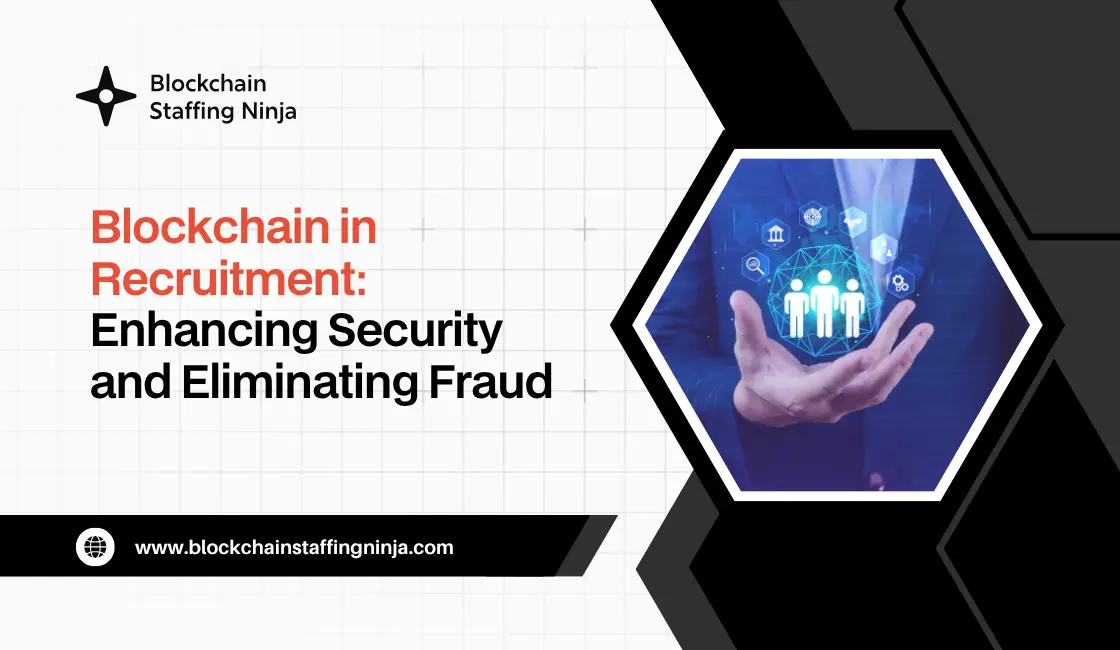Recent years have seen a boom in the need for blockchain, Web3, and crypto expertise due to the industry’s increasing popularity and quick innovation. But as remote work and international recruiting grow more common, the hazards also increase, particularly for specialized tech positions where it can be difficult to verify qualifications and expertise. Employers are at risk due to the growth in hiring fraud. To establish a secure hiring process based on transparency and trust, we will examine in this article how to work with a blockchain recruitment company and utilize blockchain technology.
The Reality of Hiring Fraud in Web3 and Blockchain
Hiring fraud is becoming more common as demand for blockchain and Web3 technology rises. This is a rising worry for businesses that operate in high-stakes, security-sensitive situations. Some candidates abuse the system in a specialized industry where it is difficult to confirm actual competence, resulting in expensive recruiting errors and serious security threats.
Common Types of Candidate Fraud
The hazards are larger with blockchain, yet bloated resumes are nothing new in the tech industry. Candidates frequently mention fake certificates, inflate their expertise, or even utilize stolen identities. According to recent research on crypto recruitment services, up to 40% of resumes contain some degree of inaccurate information, which puts businesses at risk of selecting unfit candidates for positions that are important to the company’s operations. Inadequate candidate verification makes it simple for dishonest candidates to get past the system.
Global and Remote Hiring Makes It Worse
Web3’s practice of remote and multinational employment makes the verification procedure more difficult. Verifying individuals’ identity and prior employment becomes difficult when you are unable to see them in person or readily contact their former employers. This makes a secure hiring process important for blockchain companies handling high-value assets and sensitive smart contracts. With pre-screened, reliable talent, a reputable Web3 recruitment agency may assist in closing that gap.
How Blockchain Technology Prevents Hiring Fraud
Blockchain technology provides an effective method to safeguard businesses and expedite recruiting as hiring fraud gets more intelligent. Employers may access tamper-proof, verified candidate data by implementing blockchain in recruiting, eliminating the need for fake credentials and resumes.
Immutable Verification of Credentials
Blockchain makes it possible to save job history, degrees, and professional credentials in an unchangeable and safe manner. Once they are entered into the ledger, these records cannot be changed or falsified. Blockchain in hiring is a trustworthy tool for preventing fraud, as it allows employers to rapidly check a candidate’s background without depending on unreliable references or sensitive documents.
Smart Contracts for Transparent Hiring
When it comes to smart contracts in recruitment, the process is automated, including job offers, executing non-disclosure agreements, and running background checks. Before proceeding, these self-executing contracts ensure that the candidate and the company have fulfilled certain requirements. This ensures complete transparency and compliance throughout the applicant lifecycle, expedites recruiting, and closes any gaps or manipulation.
Advantages of Blockchain-Driven Recruitment
Using a blockchain recruitment company has several advantages, particularly in high-stakes sectors like cryptocurrency and Web3, which directly solve today’s employment issues.
- Verifiable Work History: Due to blockchain technology, employers can instantaneously confirm a candidate’s employment history, qualifications, and skills. This lessens the need for references and the possibility of resume fraud.
- Faster Hiring Cycles: The recruiting process is much faster when credentials are easily accessible and important procedures are automated by smart contracts, perfect for blockchain companies that move quickly.
- Reduced Administrative Work: These self-executing contracts reduce the need for ongoing HR follow-ups and remove delays. Blockchain-stored documents are immediately available and securely time-stamped, reducing paperwork and back-and-forth correspondence.
- Fewer Bad Hires: Blockchain technology makes access to tamper-proof, validated records of a candidate’s qualifications, work history, and even project contributions possible. Blockchain-backed profiles provide a single source of truth, unlike conventional resumes subject to manipulation or exaggeration.
- Better Compliance with Global Regulations: Blockchain technology’s transparent and decentralized architecture produces auditable, securely stored, and unchangeable records of hiring procedures, including consent forms and background checks. This facilitates compliance with legal and regulatory standards across several jurisdictions.
How to Integrate Blockchain into Your Hiring Process
Blockchain implementation in hiring doesn’t need a radical change; it merely calls for a methodical, clever strategy.
- Partnering with a blockchain recruitment company: Partner with a blockchain-focused employment agency. Utilize their industry knowledge and pre-verified talent to reduce fraud and speed up recruiting.
- Verifying resumes using AI: Blockchain-based technologies can implement quick, reliable verification; these platforms keep certificates, employment history, and education on a tamper-proof ledger.
- Examining: Examine resources that provide digital ID verification based on blockchain technology.
- Automation: Use smart contracts to automate agreements. Smart contracts can expedite employment offers, NDAs, and onboarding procedures by carrying out pre-established conditions without human intervention.
- Educating HR departments: Educating HR departments about blockchain technology for hiring is an important procedure to guarantee seamless adoption and optimal return on investment. Train your HR personnel on the proper use of blockchain technologies.
Conclusion
In the rapidly evolving world of blockchain and cryptocurrency, where security and trust are paramount, hiring fraud is becoming an increasingly serious concern. But technology itself has the answer. Blockchain-driven recruiting procedures enable businesses to develop safe, transparent, and verifiable employment processes. In addition to preventing fraud, this gives your company a reputation for being reliable and progressive, two important benefits in a competitive labor market. Hiring is entering a new era that is based on blockchain technology.
 blockchain-staffing-ninja
blockchain-staffing-ninja